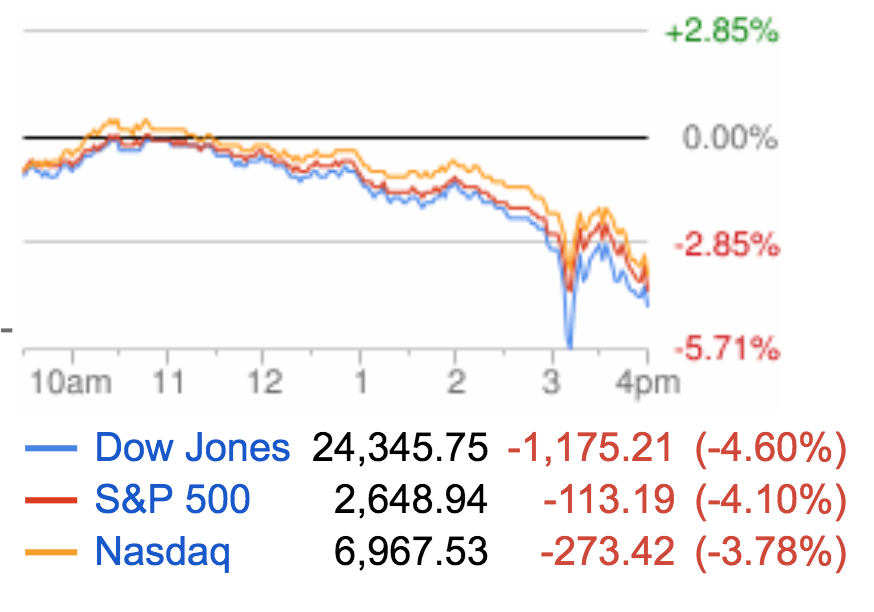Dear Friends,
We rarely deliver a mid-quarter email, but the last two days of large drops in the equities markets and recent conversations with clients have prompted us to provide this update.
On Friday, the Dow Jones Industrial Average dropped 666 points (2.6%), which was followed by a 1,175 point drop (4.6%) today.
The S&P500 (a far broader index of stocks) dropped 60 points (2.1%) on Friday, followed by a 113 point drop (4.1%) today.
Intra-day action was even more extreme, with the market down over 6% mid-day today (almost 1600 points on the Dow).
These drops have brought us 1% below where the market was at the beginning of the year and below where broad markets traded when the tax bill was passed in December.
Though these are large point drops, they are not particularly extreme when seen in percentage terms. 4% one-day drops are relatively frequent, occurring every several years, the last one was in 2011. The Dow has dropped by over 7% on 20 separate occasion, four of those drops occurred in 2008 alone.
In its 95 year history, the S&P 500 (which includes a far larger group of stocks) has dropped by more than 5% on at least 20 separate days. Today’s drop, though severe, did not make it into that list.
Viewed in a broader perspective, these drops are severe, but not extreme.
That said, as we cautioned in our annual outlook, stocks remain at historically high levels with various indicators suggesting headwinds for businesses and stock market investors. Stock market valuations are at cyclical peaks. The US economy has been expanding for 9 years, making this one of the longest booms in history. Job growth has slowed over the past year, signalling some economic cooling, though unemployment remains very low and corporate earnings are strong. Underlying economic conditions are still robust, but elevated valuations remain a concern.
In our view, the recent skittishness in equities markets is driven mostly by interest rates. Interest rates on long dated bonds (10-30Y) have continued to climb. The 10Y treasury yield in particular has risen sharply this year. These long-term rates drive key economic decisions and are one of the indicators we watch closely. The 10Y rate is used to price most mortgages, and many companies use 5-10 year rates to evaluate the costs/benefits of projects and investments. Rising rates increase costs for home-buyers and all long-term investments, reducing activity in these sectors. Rising rates also impact disposable income for investors who carry credit card balances (which are at an all time high), and for investors who trade on margin (margin balances are also at an all time high). Most importantly, rising rates impact corporate earnings. US corporate debt stands at almost $9 Trillion. Not all of it is held by public companies, and rates on most corporate debt is pre-set for a period of years. Still, every 1% rise in interest rates translates into tens of billions in additional interest expense for corporations, reducing corporate profits.
Though today saw a large drop in longer-term rates as investors rushed to the safety of Treasuries, we believe this is temporary and rates will continue to rise in the near term. The Fed will continue to unwind its bloated balance sheet to the tune of $30 billion a month, providing a source of supply for skittish equities investors retreating to bonds.
Overall, higher interest rates act as a brake on economic activity. It is this anticipation of higher interest rates and an end to the Fed’s unprecedented policy of quantitative easing that is driving the stock market declines.
We reiterate our year-end advice. Investors should adopt a cautious allocation and be aware of the headwinds we face.
Please give us a call at 646-450-9772 if you would like to discuss your specific circumstances.
Regards,
Subir Grewal, CFA, CFP Louis Berger
